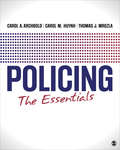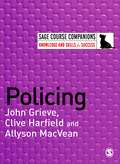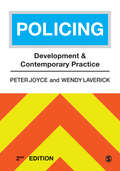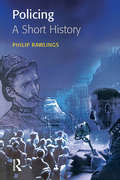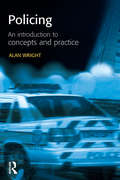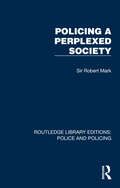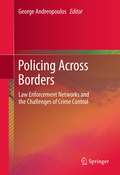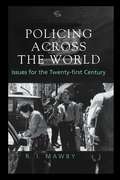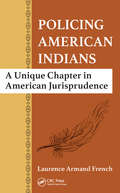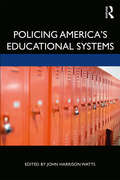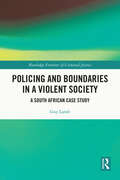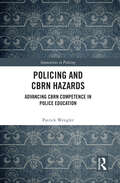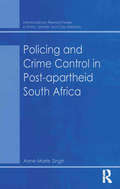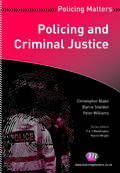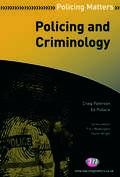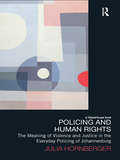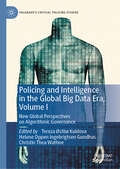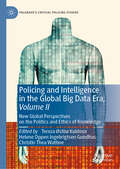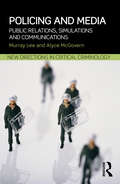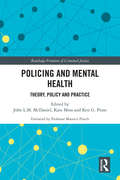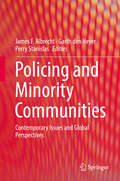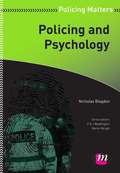- Table View
- List View
Policing: The Essentials
by Carol A. Archbold Carol My Huynh Thomas J. MrozlaOffering a brief, accessible, and timely introduction, Policing: The Essentials, hones in on core concepts and provides strong coverage on the foundations of policing. Authors Carol A. Archbold, Carol M. Huynh, and Thomas Mrozla use contemporary scholarship to focus on the current climate of policing and criminal justice, crafting one of the most diverse and inclusive books for the policing course. With a unique chapter on police effectiveness and community policing, plus ample opportunities for critical thinking and application by the reader, Policing: The Essentials offers a close examination of what matters in policing today and provides students with the key information they need to understand modern policing practices in our society.
Policing: The Essentials
by Carol A. Archbold Carol My Huynh Thomas J. MrozlaOffering a brief, accessible, and timely introduction, Policing: The Essentials, hones in on core concepts and provides strong coverage on the foundations of policing. Authors Carol A. Archbold, Carol M. Huynh, and Thomas Mrozla use contemporary scholarship to focus on the current climate of policing and criminal justice, crafting one of the most diverse and inclusive books for the policing course. With a unique chapter on police effectiveness and community policing, plus ample opportunities for critical thinking and application by the reader, Policing: The Essentials offers a close examination of what matters in policing today and provides students with the key information they need to understand modern policing practices in our society.
Policing: Investigation, Community And Partnership (SAGE Course Companions series)
by John Grieve Clive Harfield Allyson MacVeanThis is the first course guide that has been developed for students of policing. It identifies the core themes and additional source material, providing an essential overview for students and a reference point for use throughout their studies. The Policing Course Companion is designed to complement and work alongside existing literature. It provides: " Easy access to the key themes in policing " Helpful summaries of the approach taken by the main course textbooks " Guidance on the essential study skills required to pass the course " Help with developing critical thinking " Taking it Further sections that suggest how readers can extent their thinking beyond the "received wisdom" " Pointers to success in course exams and written assessment exercises The SAGE Course Companion in Policing is much more than a revision guide for undergraduates; it is an essential tool that will help readers take their course understanding to new levels and help them achieve success in their undergraduate course. John Grieve is a former Director of Intelligence for the Metropolitan Police, where he also held a number of other senior roles. He is now Chair of the John Grieve Centre for Policing and Community Safety and Emeritus Professor at London Metropolitan University. Clive Harfield is a former police Inspector and is now the Deputy Director of the John Grieve Centre for Policing and Community Safety, London Metropolitan University. Allyson MacVean is Founder and Director of the John Grieve Centre for Policing and Community Safety, London Metropolitan University.
Policing: Development and Contemporary Practice
by Dr Peter JoyceThis lively and comprehensive text combines an overview of the historical development of policing in the UK, with discussion of current debates and practice. It provides a global and comparative context, in order to shed light on contemporary issues. The book equips students with an in-depth understanding of the challenges and complexities of modern policing, including: " the relationship between the police and other criminal justice agencies " styles and approaches in practice " how to police political violence " diversity and the police " police accountability Featuring chapter summaries, case studies, study questions, an expansive glossary and a date chart listing significant events, the book is easy to use and helps students to reflect upon key themes. It is essential reading for criminology, criminal justice and policing undergraduates.
Policing: Development and Contemporary Practice
by Peter Joyce Wendy LaverickA comprehensive introduction to policing in England and Wales, providing you with an in-depth understanding of the challenges and complexities of modern policing and an increased awareness of the history and development of the profession. This second edition covers the most pressing debates and issues associated with contemporary policing and examines a range of key topics such as methods of policing, diversity and the police, police accountability, and much more. The new edition includes: A new chapter on women in policing Expanded content on diversity issues within the police service An account of the changes to transnational policing as a result of Brexit Reflections on the use of social media by police Advice for those wanting to embark on a career in the field. Written in an introductory way that is ideal for any policing, criminology, or criminal justice student new to police studies.
Policing: Development and Contemporary Practice
by Peter Joyce Wendy LaverickA comprehensive introduction to policing in England and Wales, providing you with an in-depth understanding of the challenges and complexities of modern policing and an increased awareness of the history and development of the profession. This second edition covers the most pressing debates and issues associated with contemporary policing and examines a range of key topics such as methods of policing, diversity and the police, police accountability, and much more. The new edition includes: A new chapter on women in policing Expanded content on diversity issues within the police service An account of the changes to transnational policing as a result of Brexit Reflections on the use of social media by police Advice for those wanting to embark on a career in the field. Written in an introductory way that is ideal for any policing, criminology, or criminal justice student new to police studies.
Policing: A short history
by Philip RawlingsThis book provides an overview of the history of policing in the UK. Its primary aim is to investigate the shifting nature of policing over time, and to provide a historical foundation to today's debates. Policing: a short history moves away from a focus on the origins of the 'new police', and concentrates rather on broader (but much neglected) patterns of policing. How was there a shift from communal responsibility to policing? What has been expected of the police by the public and vice versa? How have the police come to dominate modern thinking on policing? The book shows how policing - in the sense of crime control and order maintenance - has come to be seen as the work which the police do, even though the bulk of policing is undertaken by people and organisations other than the police. This book will be essential reading for anybody interested in the history of policing, on how differing perceptions emerged on the function of policing on the part of the public, the state and the police, and in today's intense debates on what the police do.
Policing: An introduction to concepts and practice
by Alan WrightThis book provides a highly readable introduction to the role and function of the police and policing, examining the issues and debates that surround this. It looks at the 'core functions' of the police, the ways in which police functions have developed, their key characteristics, and the challenges they face. From the outset questions are asked about the conceptual contestability and ambiguity of policing, and different views of police roles are addressed in turn: policing as social control, crime investigation, managing risk, policing as community justice, and as a public good.
Policing a Perplexed Society (Routledge Library Editions: Police and Policing)
by Sir Robert MarkShould policemen be armed? Do they want to be? How fair is police interrogation? Are the police too tough on demonstrators? How often are the guilty acquitted? Do we get the police force we deserve? Originally published in 1977, Sir Robert Mark considers these and many other issues. His period as Commissioner of the Metropolitan Police Force would mark something of an epoch, not only because of the challenge of brutal terrorism or his success as a leader, but because he was a bold innovator, thoughtful and articulate, whose work could be readily assessed because he believed in ‘telling the public all you can’ (the official memorandum on this appears here as an appendix). One change affecting the CID, described in this book, is characterised by Sir Robert himself as the most important single change since the Metropolitan Police was founded by his namesake Sir Robert Peel. The opening chapter describes the organisation and functioning of this country’s police at the time, the way in which they epitomise and are restricted by a free society and alone see the whole picture of criminal justice – in a sense here Sir Robert speaks over the heads of the legal profession to the public. The next important chapter contains the first open discussion of modern police-army cooperation in this country, but Sir Robert emphasises that a democratic society cannot be controlled by force and that the police exist for the maintenance of public order, irrespective of party, of sectional interests and of the government of the day. They are an example of the British genius for successful institutional compromise. Subsequent chapters examine these themes in more detail and from different angles; discuss manpower limitations and maldistribution; emphasise how the individual police officer, man or woman, is the anvil on which society beats out the problems of social inequality, racial prejudice and ghettoes, weak and ineffectual legislation. There are chapters on violence and on that London speciality, the demonstration. In the author’s view, the police officer, daily thrown back on his understanding of basic Christian precepts, has now left his Victorian ‘artisan status’ far behind – and the present Metropolitan Commissioner compels consideration of the police officer’s point of view.
Policing Across Borders
by George AndreopoulosGlobalization has had a sharp impact on the definition of 'national security,' as the interconnectedness of many threats calls for them to be addressed at the national and global level simultaneously. Law enforcement efforts must increasingly include elements of international and transnational communication and cooperation. Police forces in different countries must find common ways to share data and track international crime trends. This timely work analyzes key challenges confronting the law enforcement community, with regards to international crime, particularly illegal trafficking and terrorism. The contributions in this volume are the result of a series of workshops that brought together international law enforcement officials, researchers, and representatives from intergovernmental organizations (IGOs) and non-governmental organizations (NGOs), to examine the need for international police cooperation, the specific challenges this presents, and to propose solutions. This work will be of interest to researchers in law enforcement, criminal justice, crime prevention, and international relations.
Policing Across the World: Issues for the Twenty-First Century
by R. I. MawbyThis wide-ranging text provides an overview of policing across different societies, and considers the issues facing the US and British police in a wider international context. The book is designed as a coherent introduction to the police.
Policing American Indians: A Unique Chapter in American Jurisprudence
by Laurence Armand FrenchBias, prejudice, and corruption riddle the history of US jurisprudence. Policing American Indians: A Unique Chapter in American Jurisprudence explores these injustices, specifically the treatment of American Indians. A mix of academic research as well as field experience, this book draws on author Laurence French‘s more than 40 years of experience
Policing America's Educational Systems
by John Harrison WattsPolicing America’s Educational Systems, edited by John Harrison Watts, describes methods of policing modern educational settings, covering both K-12 public school and public or private colleges and universities. Using topical examples, subject-matter experts introduce the history of policing in elementary and high schools, the legal context governing educational institutions, and ways to assess risk and prevent or respond to crime, including active-shooter incidents. The opening section covers primary and secondary education, while the second focuses on postsecondary educational settings. A final section offers a theoretical approach to understanding campus crime and discusses the role of counseling and mental health in keeping students safe. A concluding chapter looks at the future of policing in education. Contributors bring both academic and practitioner experience to each topic covered, and useful features include learning objectives, chapter summaries, key terms, and discussion questions that further explore the issues and controversies covered in that section. This textbook is designed for courses in school or campus policing within criminal justice, social work, and sociology programs, and is also appropriate for in-service training for professionals involved in school or campus policing and safety.
Policing and Boundaries in a Violent Society: A South African Case Study (Routledge Frontiers of Criminal Justice)
by Guy LambThis book explores how social and territorial boundaries have influenced the approaches and practices of the South Africa Police Service (SAPS). By means of a historical analysis of South Africa, this book introduces a new concept, ‘police frontierism’, which illuminates the nature of the relationships between the police, policing and boundaries, and can potentially be used for future case study research. Drawing on a wealth of research, this book examines how social and territorial boundaries strongly influenced police practices and behaviour in South Africa, and how social delineations amplify and distort existing police prejudices against those communities on the other side of the boundary. Focusing on cases of high-density police operations, public-order policing and the recent policing of the COVID-19 lockdown, this book argues that poor economic conditions combined with an increased militarisation of the SAPS and a decline in public trust in the police will result in boundaries continuing to fundamentally inform police work in South Africa. This book will be of interest to scholars and students interested in policing in post-colonial societies characterised by high levels of violence, as well as police work and police militarization.
Policing and CBRN Hazards: Advancing CBRN Competence in Police Education (Innovations in Policing)
by Patrick WenglerThis book makes an important contribution to police scholarship by focusing on the critical need for law enforcement personnel to receive education on chemical/biological/radiological/nuclear (CBRN) hazards. Under the CBRN umbrella are chemical warfare agents, toxic industrial chemicals, biologically derived toxins, radiological particulate hazards, and other agents, any of which have the potential to inflict bodily harm, incapacitation, or death. Such weapons have been a part of human history for centuries, starting with biological warfare, later shifting over to chemical warfare, and in the last century, radiological and nuclear warfare. The greater availability and accessibility of such materials necessitates that first response and investigation is no longer limited to the military but is required of police forces reacting to incidents in the community, whether acts of terrorism, traffic accidents, or standard industrial incidents. In this book it is argued that basic knowledge of CBRN is essential for police officers at all levels to assess and protect crime scenes, as well as to investigate cases involving CBRN materials. The author uses case studies and technical education to instruct police on how and when CBRN agents can be used maliciously, and the best methods for identifying, analysing, monitoring, and investigating related incidents. The text makes a clear case for integrating CBRN studies into police education so that first responders are enabled to assess incidents and share information with emergency management and other services to determine the most effective equipment and personnel to deploy. This book is essential for police educators and trainers in both universities and police academies, those administering or engaged in in-service police training, and scholars studying policing, criminal justice, and terrorism.
Policing and Crime Control in Post-apartheid South Africa
by Anne-Marie SinghOnce a marginal political issue, crime control now occupies a central place on the social, political and economic agenda of contemporary liberal democracies. Nowhere more so than in post-apartheid South Africa, where the transition from apartheid rule to democratic rule was marked by a shift in concern from political to criminal violence. In this book Anne-Marie Singh offers a comprehensive account of policing transformations in post-apartheid South Africa. Her analysis of crime and mechanisms for its control is linked to an analysis of neo-liberal policies, providing the basis for a critique of existing analyses of liberal democratic governance. Themes addressed in the book include the exercise of coercive authority, state and non-state expertise in policing, the 'rationally-choosing' criminal, and the importance of developing an active and responsible citizenship.
Policing and Criminal Justice (Policing Matters Series)
by Christopher Blake Barrie Sheldon Peter WilliamsThis text provides an accessible and up-to-date introduction to criminal justice for all those undertaking degrees and foundation degrees in policing. It will also be relevant to degree courses in criminology and criminal justice. The book provides a holistic overview of the Criminal Justice System (CJS) and an exploration of the roles of key players within the system and how the police interact with these organisations. It examines some of the principles that underpin the ′modernisation′ of the police, in particular how the police service collaborates with partner agencies and the rationale associated with the Change Agenda.
Policing and Criminology (Policing Matters Series)
by Craig Paterson Ed PollockA concise and up to date introduction to criminology for those undertaking degrees and foundation degrees in policing, police studies and related subjects. It provides an introduction to criminological perspectives on the development of the police service over the last 200 years alongside an overview of contemporary themes. Key topics include the changing role of policing, police governance and accountability, policing philosophies and strategies and the globalisation of policing. The book also examines the role criminology has played in the modernisation agenda and police reform, the shift to evidence-led policing, and the relationship between criminological theory and police practice.
Policing and Human Rights: The Meaning of Violence and Justice in the Everyday Policing of Johannesburg (Law, Development and Globalization)
by Julia HornbergerPolicing and Human Rights analyses the implementation of human rights standards, tracing them from the nodal points of their production in Geneva, through the board rooms of national police management and training facilities, to the streets of downtown Johannesburg. This book deals with how the unprecedented influence of human rights, combined with the inability by police officers to ‘live up’ to international standards, has created a range of policing and human rights vernaculars – hybrid discourses that have appropriated, transmogrified and undercut human rights. Understood as an attempt by police officers, as much as by the police as a whole, to recover a position from which to act and to judge, these vernaculars reveal the compromised ways in which human rights are – and are not – implemented. Tracing how, in South Africa, human rights have given rise to new forms of popular justice, informal ‘private’ policing and provisional security arrangements, Policing and Human Rights delivers an important analysis of how the dissemination and implementation of human rights intersects with the post-colonial and post-transformation circumstances that characterise many countries in the South.
Policing and Intelligence in the Global Big Data Era, Volume I: New Global Perspectives on Algorithmic Governance (Palgrave's Critical Policing Studies)
by Tereza Østbø Kuldova Helene Oppen Ingebrigtsen Gundhus Christin Thea WathnePolicing and Intelligence in the Global Big Data Era, Volume I, the first of a two volume set, presents a rich and unique collection of global perspectives on data-driven predictive technologies and the expansion and use of surveillance apparatuses in policing and intelligence, both public and private. Centered around the notion of ‘algorithmic governance’, this volume explores various practices of abstract and intelligence-led policing within the context of surveillance and regulatory capitalism. Each chapter interrogates these concepts as much as realities on the ground as they play out across the globe – from Russia, USA, India, Brazil to Denmark, Germany and Norway. The volume offers a unique insight into the ways in which technologies and data-driven practices – from facial recognition, predictive algorithms, to generative AI – are reshaping cultures of policing both within and beyond police proper. Particular attention is paid to the simultaneous privatization and pluralization policing and intelligence and to the proliferation of new intelligence actors. Academics, students and readers interested in the fields of criminology, social anthropology, critical algorithm.
Policing and Intelligence in the Global Big Data Era, Volume II: New Global Perspectives on the Politics and Ethics of Knowledge (Palgrave's Critical Policing Studies)
by Tereza Østbø Kuldova Helene Oppen Ingebrigtsen Gundhus Christin Thea WathneThis volume, the second of a two volume set, offers a rich and unique collection of global perspectives on data-driven predictive technologies and the expansion and use of surveillance apparatuses in policing and intelligence, both public and private. Volume II delves into the epistemologies of data, into the imaginaries of accuracy, and fantasies of technosolutionism, utilizing empirical case studies to interrogate the use of data in policing, while raising questions pertaining to governance, ethics and knowledge construction. The chapters span from exploring the construction of clean and dirty data in private and public policing in South Africa, discussions about facial recognition and technopolitics in Brazil, the construction of intelligence and organizational learning in Norwegian police ethics and broader questions of transparency, data quality, and trust in data-driven policing, to the very topical issues of policing of generative AI and the ways in which both authoritarian and liberal democracies, such as China and India, use biopolitics to turn social welfare into surveillance. Academics and students of criminology, social anthropology, critical algorithm studies, critical sociology, and regional studies, will find this timely volume of interest.
Policing and Media: Public Relations, Simulations and Communications (New Directions in Critical Criminology)
by Murray Lee Alyce McGovernThis book examines the relationship between police, media and the public and analyses the shifting techniques and technologies through which they communicate. In a critical discussion of contemporary and emerging modes of mediatized police work, Lee and McGovern demonstrate how the police engage with the public through a fluid and quickly expanding assemblage of communications and information technologies. Policing and Media explores the rationalities that are driving police/media relations and asks; how these relationships differ (or not) from the ways they have operated historically; what new technologies are influencing and being deployed by policing organizations and police public relations professionals and why; how operational policing is shaping and being shaped by new technologies of communication; and what forms of resistance are evident to the manufacture of preferred images of police. The authors suggest that new forms of simulated and hyper real policing using platforms such as social media and reality television are increasingly positioning police organisations as media organisations, and in some cases enabling police to bypass the traditional media altogether. The book is informed by empirical research spanning ten years in this field and includes chapters on journalism and police, policing and social media, policing and reality television, and policing resistances. It will be of interest to those researching and teaching in the fields of Criminology, Policing and Media, as well as police and media professionals.
Policing and Mental Health: Theory, Policy and Practice (Routledge Frontiers of Criminal Justice)
by John L.M. McDaniel Kate Moss Ken G. PeaseThis book explores the relationship between policing and mental health. Police services around the world are innovating at pace in order to develop solutions to the problems presented, and popular models are being shared internationally. Nevertheless, disparities and perceptions of unfairness remain commonplace. Innovations remain poorly funded and largely unproven. Drawing together the insights of eminent academics in the UK, the US, Australia and South Africa, the edited collection evaluates the condition of mental health and policing as an interlocked policy area, uncovering and addressing a number of key issues which are shaping police responses to mental health. Due to a relative lack of academic texts pertaining to developments in England and Wales, the volume contains a distinct section on relevant policies and practices. It also includes sections on US and Australian approaches, focusing on Crisis Intervention Teams (CITs), Mental Health Intervention Teams (MHITs), stressors and innovations from Boston in the US to Queensland in Australia. Written in a clear and direct style, this book will appeal to students and scholars in policing, criminology, sociology, mental health, cultural studies, social theory and those interested in learning about the condition and trajectory of police responses to mental health. Foreword written by Professor Maurice Punch.
Policing and Minority Communities: Contemporary Issues and Global Perspectives
by Perry Stanislas James F. Albrecht Garth Den HeyerThis insightful book examines the allegations against the professionalism, transparency, and integrity of law enforcement toward minority groups, from a global perspective. It addresses the challenges inherent in maintaining strong ties with members of the community, and draws attention to obstacles in ensuring public confidence and trust in rule of law institutions. Most importantly, the book provides insight into mechanisms and proposals for policy reform that would permit enhanced police-community partnership, collaboration and mutual respect. Acknowledging the consistency of this concern despite geographic location, ethnic diversity, and religious tolerance, this book considers controversial factors that have caused many groups and individuals to question their relationship with law enforcement. The book examines the context of police-community relations with contributed research from Nigeria, South Africa, Kosovo, Turkey, New Zealand, Mexico, Scandinavia and other North American and European viewpoints. It evaluates the roles that critical factors such as ethnicity, political instability, conflict, colonization, mental health, police practice, religion, critical criminology, socialism, and many other important aspects and concepts have played on perceptions of policing and rule of law. A valuable resource for law enforcement practitioners and researchers, policy makers, and students of criminal justice, Policing and Minority Communities: Contemporary Issues and Global Perspectives confronts crucial challenges and controversies in policing today with quantitative and qualitative research and practical policy recommendations.
Policing and Psychology (Policing Matters Series)
by Nicholas BlagdenThis book draws on a range of psychological theories, concepts and research to explore the role and relevance of psychology to modern day policing. It focuses on key issues including psychological theories of criminal behaviour, interpersonal skills, stereotyping and prejudice, profiling,the psychological effects of crime on victims, and burnout and stress on offiers. The text is underpinned by reflectie activities and case studies encouraging a critical understanding of psychology applied to policing practice. This book provides an accessible and up-to-date textbook for those studying and teaching policing, psychology and criminology.
